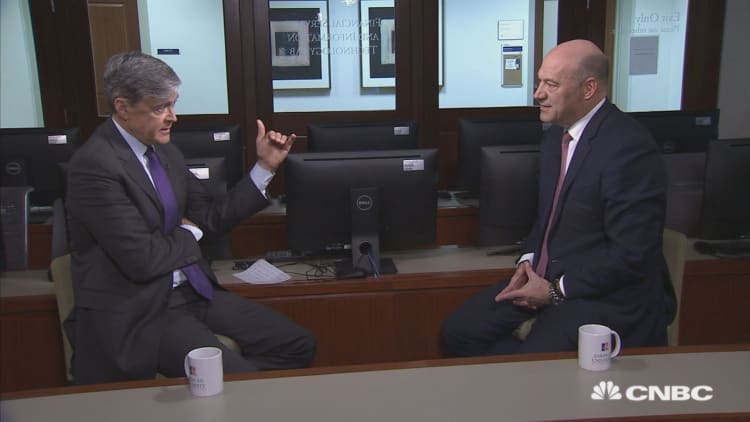
CNBC's John Harwood sat down with National Economic Council Director Gary Cohn to discuss a range of topics, including the matter of luring companies to stay in America. What follows is a condensed, edited transcript of their conversation.
Harwood: Do you think the economic effects you're describing will take place even if firms don't take money that they repatriate and invest, but instead give it into share buybacks as they did the last time we had a holiday?
Cohn: Absolutely. The minute we pass the law, you are going have to take an accrual on your books for the taxes owed on that money. Once you end up owing us the taxes, now you're making a business decision. If people bring the money back because they think there's an economic return that makes sense here in the United States, we believe there's a great economic sense. If they go to your alternative, which is that they issue dividends, or they buy back stock, guess what? We get another 20 percent tax on the money that they issued in dividends or they issue in taxes. So, we get a repatriation tax, we get a dividend or capital gains tax. But people to get those dividends, or they get those capital gains, they're probably investors. What are they going to do? They're going to go reinvest that money back in the market.
Harwood: That doesn't limit the wage effects you guys are expecting, the idea that you're going to hire more workers and pay the marginal worker more?
Cohn: I'm saying the open investor doesn't want the money. If I got a pool of capital invested in the market today, and you send me a big dividend, I'm most likely sending that money back to someone else so they can reinvest it and hire workers.
Harwood: The Penn-Wharton model that was run by this former Bush economist has got a new projection out that shows that there is a chance that this will shrink the economy in the long run because of the deficit drag.
Cohn: We don't agree with that. We believe that we're going to have a very stimulative effect on the economy by lowering the business tax rate, by lowering the corporate rate, and making America competitive with the rest of the world. Look, a year ago, I was on the other side of this equation. I was advising companies how to get out of the burdensome U.S. tax system. We were talking about inversions — we were talking about moving companies out of the United States. The most compelling presentation I could make to a board is, hey, I can turbocharge your earnings without doing anything in your company. I can just relocate your domicile, and you can hold your board meetings, you can do a few things, and you can go from a 35 percent tax rate to a 15 percent tax rate. You can deliver 20 percent of your earnings to the bottom line.
Harwood: Did you feel guilty advocating that as an American?
Cohn: No. I didn't feel guilty because boards have a fiduciary responsibility to their shareholders. That's what they're supposed to do. So, you know what? We're going to make America competitive. We're going to make it compelling for people to build their companies in America.
Harwood: You, I imagine, are the point person in the White House for big CEOs because you come from their world, they know you. What are you hearing from them right now?
Cohn: The most excited group out there are big CEOs, about our tax plan. They all tell me how they excited they are to get a tax plan that makes the United States competitive, makes it so they can grow their business domestically, makes it so they can — actually pay wages here. People have trapped their money offshore. So, you can't pay U.S. workers. You can pay non-U.S. workers, 'cause you've got the money offshore.
Harwood: Don't businesses have a ton of domestic cash?
Cohn: Well, they borrow money at home to expand if they want to expand at home, but their real earnings are trapped offshore. If companies were making that money onshore, they'd be paying their labor, they'd be paying their workers more money. So, our biggest supporters are really the Business Roundtable. When you talk to all the CEOs — they're the most excited about this.
Read more from the Gary Cohn Speakeasy interview:
... on Goldman Sachs and the White House.
... on repealing the estate tax.
... on Cohn's plan after tax reform.
... on the value of trickle-down economics.


